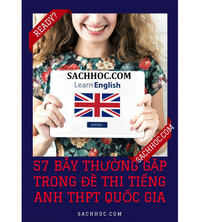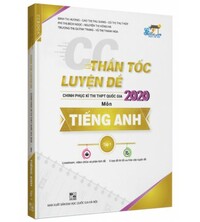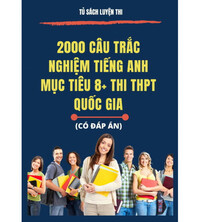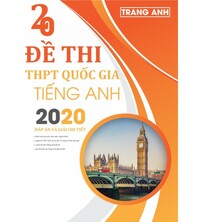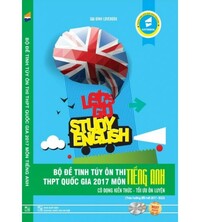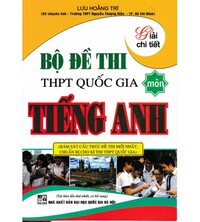Đề ôn thi THPT Quốc gia môn tiếng Anh
Tìm Đáp Án xin giới thiệu đến các bạn Đề thi thử THPT Quốc gia môn Tiếng Anh năm 2017 trường THPT Thuận Thành I, Bắc Ninh có đáp án do Tìm Đáp Án sưu tầm và đăng tải là nguồn tài liệu không thể bỏ qua dành cho các bạn đang gấp rút ôn luyện chuẩn bị cho kì THPT Quốc gia đang đến rất gần. Ngoài đáp án còn có lời giải thích chi tiết giúp bạn ghi nhớ và nắm kiến thức vững hơn. Sau đây mời các bạn vào tham khảo.
Tổng hợp ngữ pháp ôn thi THPT Quốc gia môn tiếng Anh
Đề thi thử THPT Quốc gia môn Tiếng Anh năm 2017 có đáp án + giải thích chi tiết (Đề luyện 1)
| THUAN THANH 1 UPPER SECONDARY SCHOOL (including 4 pages) | THE TRIAL ENTRANCE EXAMINATION Subject: English (No material allowed) |
(156051) Mark the letter A, B, C, or D on your answer sheet to indicate the word that differs from the rest in the position of the main stress in each of the following questions.
1. A. cultural B. priority C. advantage D. occurrence
2. A. diversity B. disastrous C. circulate D. alternative
(156054) Mark the letter A, B, C, or D on your answer sheet to indicate the word that has underlined part pronounced differently from the rests.
3. A. likes B. tightens C. heaps D. fuss
4. A. demand B. deny C. deter D. debris
(156057) Mark the letter A, B, C, or D to indicate the word or phrase that is CLOSEST in meaning to the underlined part in each of the following questions.
5. I'll take the new job whose salary is fantastic.
(A). reasonable (B). acceptable (C). pretty high (D). wonderful
6. Ralph Nader was the most prominent leader of the U.S consumer protection movement.
(A). casual (B). significant (C). promiscuous (D). aggressive
(156060) Mark the letter A, B, C, or D on your answer sheet to indicate the word (s) OPPOSITE in meaning to the underlined word(s) in each of the following questions.
7. A chronic lack of sleep may make us irritable and reduces our motivation to work.
(A). calm (B). responsive (C). uncomfortable (D). miserable
8. Fruit and vegetables grew in abundance on the island. The islanders even exported the surplus.
(A). large quantity (B). small quantity (C). excess (D). sufficiency
(156063) Read the following passage and mark the letter A, B, C or D on your answer sheet to indicate the correct word for each of the blanks.
When you wave to a friend, you are using sign language. When you smile at someone, you mean to be (9)_____________. When you put one finger in front of your (10)____________, you mean, "Be quiet." Yet, people in different countries may use different sign languages. Once an Englishman was in Italy he could speak a little Italian. One day while he was walking in the street, he felt (11)____________ and went into a restaurant. When the waiter came, the Englishman opened his mouth, put his fingers into it and took them out again and moved his lips. In this way, he meant to say, "Bring me something to eat." But the waiter brought him a lot of things to (12)________: first tea, then coffee, then milk, but no food. The Englishman was sorry that he was not able to tell the waiter he was hungry. He was eardy to leave the restaurant. When another man came in and put his hands on his stomach. And this sign was (13)_________ enough for the waiter. In a few minutes, the waiter brought him a large plate of bread and meat. At last, the Englishman had his meal in the same way.
9. (A). well (B). friendly (C). fine (D). careful
10. (A). eyes (B). legs (C). mouth (D). head
11. (A). hungry (B). tired (C). cold (D). ill
12. (A). eat (B). watch (C). drink (D). read
13. (A). quick (B). big (C). strong (D). clear
(156069) Mark the letter A, B , C, or D on your answer sheet to indicate the most suitable response to the following situations.
14. Ivan: I have stacks of homework to do. Kyle:____________!
(A). Congratulations (B). Poor you (C). Cheers (D). Oh bother
15.Tom: I'm going on holiday tomorrow. Jerry:_____________!
(A). Congratulations (B). Sorry to here that (C). Have a nice time (D). Watch out
(156072) Mark the letter A, B, C, or D on your answer sheet to show the underlined part that needs correction.
16. Both bowling and ice-skating was introduced by the Dutch who colonized the New World in the 1600's.
(A). Both (B). was introduced (C). who (D). colonized
17. There are a large supply of pens and notebooks in the storeroom to the left of the library entrance.
(A). are (B). of pens (C). in the storeroom (D). to the left
18. There are many ways to preserve fruit, for example freezing, canning and to dry.
(A). There are (B). to (C). fruit (D). to dry
(156076) Mark the letter A, B, C, or D on your answer sheet to show the option that best makes the meaningful sentence.
19. person's choice/ occupations/ probably/ most important/ have/ made.
(A). A person's choice of occupation is probably the most important one that has to be made.
(B). A person's choice about occupation is probably most important one to have made.
(C). A person's choice from occupation is probably the most important one has to be made.
(D). A person's choice among occupation is probably most important having made.
20. my opinion/ unfair/ women/ more duties/ husbands.
(A). According to my opinion it is unfair when women have more duties than their husbands.
(B). My opinion is unfair for women to have more duties than their husbands.
(C). My opinion it is unfair that women have more duties than their husbands.
(D). My opinion, which seems to be unfair, is that women should have more duties than their husbands.
(156079) Read the following passage and mark the letter A, B, C, or D on your answer sheet to indicate the correct answer to the following questions.
Algae is a primitive form of life, a single-celled or simple multiple-celled organism that is able to conduct the process of photosynthesis. It is generally found in water but can also be found elsewhere, growing on such surfaces as rocks or trees. The various types of algae are classified according to pigment.
Blue-green algae, or Cyanophyta, can grow at very high temperatures and under high-intensity light. This type of algae is the oldest form of life with photosynthetic capabilities. Fossilized remains of blue-green algae more than 3.4 billion years old have been found in parts of Africa.
Green algae, or Chlorophyta, is generally found in fresh water. It reproduces on the surfaces of enclosed bodies of water such as ponds or lakes and has the appearance of a fuzzy green coating on the surface of the water.
Brown algae, or Phaeophyta, grows in shallow, temperate water. This type of algae is the largest in size and is most recognizable as a type of seaweed. Its long stalks can be enmeshed on the ocean floor, or it can float freely on the ocean's surface.
Red algae, or Rhodophyta, is a small, delicate organism found in the deep waters of the subtropics. This type of algae has an essential role in the formation of coral reefs: it secretes lime from the seawater to foster the formation of limestone deposits.
21. What is the author's main purpose?
(A). To show what color algae is
(B). To differentiate the various classifications of algae
(C). To describe where algae is found
(D). To clarify the appearance of different types of algae
22.Which of the following is NOT true about algae?
(A). All types have one cell only. (B). It can be found out of water.
(C). It can use photosynthesis. (D). It is not a relatively new form of life.
23. The word "pigment" at the end of the first paragraph means......... .
(A). size (B). shape (C). composition (D). color
24. Algae remnants found in Africa are......... .
(A). still flourishing (B). photogenic (C). extremely old (D). red in color
25. Green algae is generally found......... .
(A). on the ocean floor (B). on top of the water
(C). throughout ponds and lakes (D). surrounding enclosed bodies of water
26. Brown algae would most likely be found......... .
(A). on trees (B). near green algae (C). on rocks (D). in the ocean
27. According to the passage, red algae is......... .
(A). sturdy
(B). huge
(C). fragile
(D). found in shallow water
28. It can be inferred from the passage that limestone deposits serve as the basis of...... .
(A). coral reefs
(B). red algae
(C). subtropical seawater
(D). secret passages


